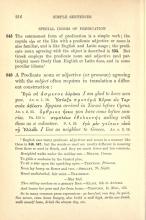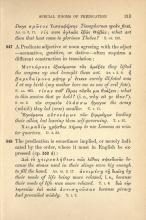545. The commonest form of predication is a simple verb; the copula εἰμι or the like with a predicate adjective or noun is also familiar, and is like English and Latin usage; the predicate noun agreeing with the object is described in § 534. But Greek employs the predicate noun and adjective (and participle) more freely than English or Latin does, and in some peculiar idioms.[fn]English uses many predicate adjectives and nouns in a manner like those in §§ 546, 547 below; but the words so used are mostly different in meaning from those so used in Greek, and they are much fewer and less common:
Benighted walks under the midday sun.
—Milton, Comus
To glide a sunbeam by the blasted pine,
To sit a star upon the sparkling spire.
—Tennyson, Princess
Noon lay heavy on flower and tree.
—Shelley, To Night
Kneel undisturbed, fair saint.
—Thackeray.
May find Thee sitting careless on a granary floor.
—Keats, Ode to Autumn
And learns her gone and far from home.
Tennyson, In Mem. viii
So in many common prose expressions: go barefoot, run dry, lie quiet, live secure, come home hungry, also build a wall high, strike one dumb, walk oneself lame, drink the stream dry, etc.[/fn]
546. A Predicate noun or adjective (or pronoun) agreeing with the subject often requires in translation a different construction.
Ἐγὼ σὲ ἄσμενος ἑόρᾱκα.
I am glad to have seen you.
Xen. Anabasis 2.1.16
Ἐπύαξα προτέρᾱ Κῡ́ρου εἰς Tαρσοὺς ἀφῑ́κετο.
Epyaxa arrived in Tarsoi before Cyrus.
Xen. Anabasis 1.2.25
ὄρθριος ἥκεις.
You have come before sunrise.
Plato Protagoras 313b
συμπλέων ἐθελοντής
sailing with them as a volunteer
Demosthenes 4.29
ἐγὼ γείτων οἰκῶ τῇ Ἑλλάδι.
I live as neighbor to Greece.
Xen. Anabasis 2.3.18
ἔλεγε πρῶτος Τισσαφέρνης.
Tissaphernes spoke first.
Xen. Anabasis 2.3.17
τίς ποτε ἀγλαᾱ̀ς ἔβᾱς Θήβᾱς;
What are thou that hast come to glorious Thebes?
Soph. Oedipus the King 153–154
547. A Predicate adjective or noun agreeing with the object— accusative, genitive, or dative—often requires a diferent construction in translation.
Mετεώρους ἐξεκόμισαν τᾱ̀ς ἁμάξᾱς.
They lifted the wagons up and brought them out.
Xen. Anabasis 1.5.8
ἦ βαρυδαίμονα μήτηρ μʼ ἔτεκεν.
Surely ill-fated was I at my birth (My mother bore me as one of evil fate).
Eur. Alcestis 865
τίνας ποθʼ ἕδρας τᾱ́σδε μοι θοάζετε;
What is this session that ye hold? (i.e.,Why sit ye thus?).
Soph. Oedipus the King 2
τὸν στρατὸν ἐλάσσω ἤγαγον.
The army (which) they led (was) smaller.
Thucydides 1.11.1
Ἡγούμενοι αὐτονόμων τῶν ξυμμάχων
leading their allies, but leaving them self-governing
Thucydides 1.97.1
Χειμαδίῳ χρῆσθαι Λήμνῳ
to use Lemnos as winter quarters
Demosthenes 4.32
548. The predication is sometimes implied, or merely indicated by the order, where it must in English be expressed (cp. § 552.d).
Διὰ τὸ χειροπλήθεσι τοῖς λίθοις σφενδονᾶν
because the stones used in their slings were big enough to fill the hand
Xen. Anabasis 3.3.17
ἀνειμένῃ τῇ διαίτῃ
by their mode of life being more relaxed (i.e., because their mode of life was more relaxed)
Thucydides 1.6.3
διὰ τὴν ληστείᾱν ἐπὶ πολὺ ἀντισχοῦσαν
because piracy had prevailed widely
Thucydides 1.7


